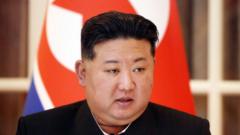The decision further intensifies the economic conflict between the U.S. and China, impacting global supply chains.
U.S. Halts Key Technology Exports to China Amid Rising Trade Tensions

U.S. Halts Key Technology Exports to China Amid Rising Trade Tensions
The Trump administration's suspension of exports aims to counter China's mineral restrictions.
The Trump administration has officially paused exports of vital U.S. technologies to China, which includes critical jet engine components, semiconductor advancements, and specific chemicals. This significant escalation comes as retaliation against China's recent imposition of export limitations on essential minerals, seen as a direct threat to American supply chains.
As the world’s two leading economies brace for potential economic confrontation, this development signals an increasing trend towards "supply chain warfare," where both nations appear keen to assert dominance over crucial economic elements. This escalation could have dire ramifications for industries reliant on foreign technologies, impacting manufacturers of airplanes, automobiles, robots, and semiconductors.
Negotiations aimed at resolution appear fraught. While a temporary agreement on reducing tariffs was reached on May 12, aimed at easing the ongoing trade war, the Biden administration’s actions suggest a hardening stance towards China. Treasury Secretary Scott Bessent previously noted a shared inclination to avoid economic decoupling, yet punitive measures against China continue to unfold, including Secretary of State Marco Rubio’s recent announcement regarding the revocation of visas for Chinese students involved in critical technological fields or linked to the Chinese Communist Party.
Despite expectations for China to relax its restrictions following the tariff rollback, U.S. officials remain dissatisfied with the current trajectory of negotiations, indicating rising tensions are likely to persist in this tumultuous bilateral relationship.
As the world’s two leading economies brace for potential economic confrontation, this development signals an increasing trend towards "supply chain warfare," where both nations appear keen to assert dominance over crucial economic elements. This escalation could have dire ramifications for industries reliant on foreign technologies, impacting manufacturers of airplanes, automobiles, robots, and semiconductors.
Negotiations aimed at resolution appear fraught. While a temporary agreement on reducing tariffs was reached on May 12, aimed at easing the ongoing trade war, the Biden administration’s actions suggest a hardening stance towards China. Treasury Secretary Scott Bessent previously noted a shared inclination to avoid economic decoupling, yet punitive measures against China continue to unfold, including Secretary of State Marco Rubio’s recent announcement regarding the revocation of visas for Chinese students involved in critical technological fields or linked to the Chinese Communist Party.
Despite expectations for China to relax its restrictions following the tariff rollback, U.S. officials remain dissatisfied with the current trajectory of negotiations, indicating rising tensions are likely to persist in this tumultuous bilateral relationship.






















